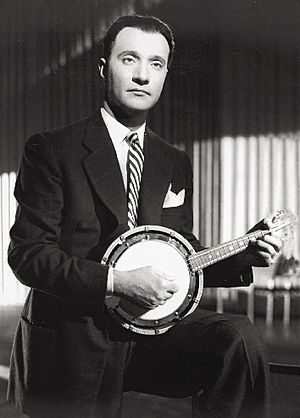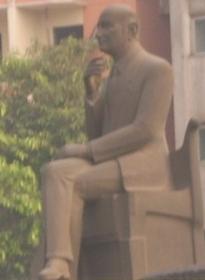Mohammed Abdel Wahab facts for kids
Quick facts for kids
Mohammed Abdel Wahhab
|
|
|---|---|

Mohammed Abd el-Wahhab with a cümbüş (mandolin)
|
|
| Background information | |
| Born | March 13, 1901 Cairo, Egypt |
| Origin | Egypt |
| Died | May 4, 1991 (aged 90) Cairo, Egypt |
| Genres | Egyptian music |
| Occupation(s) |
|
| Instruments |
|
| Years active | 1917–1991 |
| Labels | Mazzika |
Mohamed Abdel Wahab (Arabic: محمد عبد الوهاب) was a famous Egyptian singer, actor, and composer. He lived from March 13, 1901, to May 4, 1991. He is most famous for his romantic and patriotic Egyptian songs.
He wrote many songs that showed his love for Egypt. Some of these songs include "Oh Egypt, happiness is here" and "Egypt has called us." These songs encouraged people to feel proud of their country.
He also helped create the national anthems for other countries. These include the anthems for Tunisia, the United Arab Emirates, and Libya.
Contents
Early Life
Mohamed Abdel Wahab was born in 1902 in Cairo, Egypt. His neighborhood, Bab El-Sheriyah, now has a statue of him. He started singing when he was very young. He first performed in public at age seven. By the time he was 13, he made his first music recording. He was also a close friend of another famous Egyptian singer, Abdel Halim Hafez.
Movie Star
In 1933, Abdel Wahab started making his own style of Egyptian musical films. He had visited Paris and learned about French musical movies. He brought a fun, lighthearted kind of musical film to Egypt. He made eight musical comedies between 1933 and 1949.
His films often showed wealthy Western characters. The music in his movies was different from traditional Egyptian tunes. He starred in his 1934 film The White Flower. This movie was very popular and is still shown in Egyptian theaters today. In 1950, Abdel Wahab stopped making films. He wanted to focus more on his singing career.
Music Master
Abdel Wahab wrote more than 1820 songs. Many people think he was one of the most creative Egyptian musicians ever. He helped start a new time for Egyptian music. He used rhythms from other countries and played the oud (a string instrument) in a special way.
Some people thought he used too much Western music in his songs. But he mixed Western rhythms into Egyptian songs in a way that fit. For example, in 1941, he used a waltz rhythm in his song "El Gandol." In 1957, he even used a rock and roll rhythm in a song for Abdel Halim Hafez.
He also wrote many popular songs for other singers. He composed hits for Najat Al Saghira, including four poems. He played the oud for the famous Egyptian poet, Ahmed Shawqi. He also wrote ten songs for the legendary singer Umm Kulthum. He was one of the first Egyptian singers to move from silent movies to singing films.
Abdel Wahab also wrote songs for the Lebanese singer Fairuz. He called her "Our Ambassador to the Stars." He even said he was the leader of her fan club in Cairo.
His Legacy
Mohamed Abdel Wahab passed away in his hometown of Cairo, Egypt, on May 4, 1991. He died from a stroke.
Abdel Wahab was very important in creating a new era of Egyptian music. His influence spread across the entire Arab world. He also introduced Egyptian music to Western classical and popular styles. He wrote the national anthems for Tunisia and Libya.
Awards and Tributes
Mohamed Abdel Wahab received many important awards during his life. These included top honors from Egypt, like the Grand Cordon of the Order of the Nile. He also received awards from other countries, such as Jordan, Lebanon, and Syria.
On March 13, 2012, Google celebrated his 110th birthday. They made a special Google Doodle to honor him.
Movies He Acted In
- The White Rose (1933)
- Doumou' el Hub (Love's Tears) (1936)
- Yahya el Hub (Long Live Love) (1938)
- Yawm Sa'id (Happy Day) (1939)
- Mamnou'a el Hub (Love Is Forbidden) (1942)
- Rossassa Fel Qalb (A Bullet in the Heart) (1944)
- Lastu mallakan (I'm No Angel) (1947)
- Ghazal Al Banat (The Flirtation of Girls) (1949)
Images for kids
See also
 In Spanish: Mohammad Abdel Wahab para niños
In Spanish: Mohammad Abdel Wahab para niños



